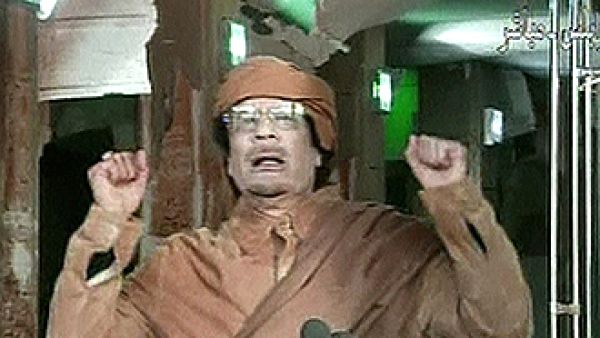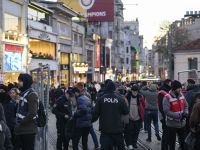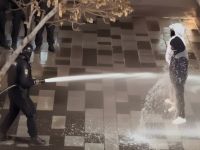Rebels searched Gaddafi strongholds in the capital yesterday and scoured the tunnels underneath his compound for any signs of him.
The stepped-up manhunt came hours after Col Gaddafi called on his supporters in an early morning radio address to "cleanse" Tripoli of "rats", and vowed to fight on "until victory or martyrdom".
Col Gaddafi described his abandonment of the Bab Al Aziziya compound, which the rebels have turned into a staging area for their operations, as a "tactical move". The White House said there was no evidence that Col Gaddafi had left Libya.
After an unidentified businessman in Benghazi, the eastern heart of the Libyan uprising, offered the reward, the National Transitional Council head Mohammed Abdel Jalil said any of Col Gaddafi's inner circle who killed or captured him would be given amnesty or pardoned for any crimes.
He also said Libya would hold elections in eight months, and if Col Gaddafi were captured alive he would be tried in Libya.
Colonel Abdallah Abu Afra, a rebel military spokesman, said rebel forces were in control of 95 per cent of Libya.
In Tripoli, however, residents were patrolling every street and alley for fear of a comeback by the regime's loyalists.
Many believed Col Gaddafi was hiding in an underground bunker in the capital.
"You know, Gaddafi is not living here. He lives underground," said a young rebel fighter, speeding away on a pickup truck inside Bab Al Aziziya compound.
"We are scared Gaddafi might come back. We heard his speech on the radio," said Najwa Omar Muhammed, stopping her car on Green Square, the symbol of Col Gaddafi's power. Ms Muhammed had just picked up her mother from her house in Abu Selim, a city neighbourhood.
"They are still fighting there and every 14-year-old kid has a gun," she said.
Forces loyal to Col Gaddafi bombed areas of central Tripoli, even targeting the compound that was once their headquarters.
Fighting was reported in areas of Bab Al Aziziya and near the five-star Rixos hotel, where more than 30 journalists were trapped for several days by armed Gaddafi supporters. They were freed yesterday with the intervention of the International Committee for the Red Cross.
Several dozen rebel fighters congregated in the Corinthia Hotel, where many foreign journalists have been lodged since arriving in recent days.
Around half a dozen young fighters armed with assault rifles and a belt-fed machine gun were checking rooms in the hotel "looking for Saidi Gaddafi", according to one fighter.
Tripoli remained a contested city - dangerous and fearful - where it was difficult to distinguish the sound of celebratory gunfire from the actual fighting.
"We would not be out with guns if we were not scared," said Abdel Nasser Mohammed Ali, a 39-year-old who returned to Libya from Denmark, where he works, to protect his family.
"Nobody is sure Gaddafi is gone. The day we will see him on TV, under arrest, we will relax. Until that day, we won't trust one another, even if we grew up in the same neighbourhood."
Some in Tripoli speculated that Col Gaddafi has fled to Sebha, a southern town reputed to be strong in pro-Gaddafi sentiment.
Fierce fighting was raging in Sebha yesterday, said Ali Idriss Hadar, 30, whose father, Idriss Hadar, was trapped in the town.
"Maybe Gaddafi is in Sebha," said Al Hadar, a translator for a Chinese oil company whose family comes from Sebha. "The cities around there have been bombarded - maybe by Nato - for the last three days."
For at least some Tripoli residents, the rebel forces' ultimate victory was a foregone conclusion.
"Bab Al Aziziya was fundamental. How can Gaddafi return now? Our revolutionaries are everywhere," said Menahil Al Afi, 21, an engineering student out shopping yesterday with her friend, Hind.
"Just the old people think Gaddafi will come back. They believe what they see on state TV," said Ahmed, a young man who was on a patrol on Imam Malik street, a few metres from his house.
He said he wasn't scared, but still declined to give his full name. "Just in case," he said. "I don't want my parents to have problems … if Gaddafi's people come back."
By John Thorne and Rolla Scolari (Foreign Correspondent)








